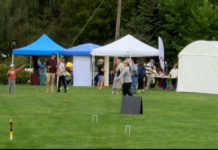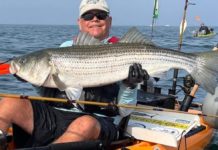Anglers will tell you, “There is an abundance of black sea bass and scup in the water.” Buzzards Bay is teaming with black sea bass anglers in spring, and along the coastal shore of Massachusetts and Rhode Island you can hardly drop a line without catching these fish.
However, for the 2022 Recreational Harvest Limit (RHL), the amount of fish anglers are allowed to catch will be reduced by 28 percent for black sea bass and 33 percent for scup coastwide.
Exactly how this will impact 2022 regulations in Massachusetts and Rhode Island has not been determined yet, but it will bring more conservative regulations for sure. More to come as these measures go through the regulatory process with states, the Commission the Council (noted below), and NOAA Fisheries as they consider approval on conservation equivalency proposals.
Earlier this month, the Mid-Atlantic Fishery Management Council and the Atlantic States Marine Fisheries Commission’s Summer Flounder, Scup, and Black Sea Bass Board approved 2023 changes to the commercial and recreational allocations of summer flounder, scup, and black sea bass during a joint meeting; visit www.mafmc.org/briefing/december-2021. The changes approved are intended to better reflect the current understanding of the historic proportions of catch and landings from the commercial and recreational sectors.
The current commercial and recreational allocations for all three species were set in the mid-1990s based on historical proportions of landings (for summer flounder and black sea bass) or catch (for scup) from each sector. The council and board developed this amendment partly in response to recent changes in how recreational catch is estimated by the Marine Recreational Information Program (MRIP), which resulted in a revised time series of recreational data going back to the 1980s. This created a mismatch between the data that were used to set the allocations and the data currently used in management for setting catch limits.
The amendment contained a range of allocation alternatives, with options that would maintain the current allocations and a variety of options to revise the allocations based on updated data using the same or modified “base years” (the time periods used to set the current allocations). The council and board ultimately voted to revise the allocations using the original base years updated with new data.
In an opinion letter, the Rhode Island Saltwater Anglers Association (which has 7,500 affiliated members in Connecticut, Massachusetts and Rhode Island) suggested to the council and commission that more current years of data should be used to better reflect present conditions, particularly climate-change impacts and fish movement. The use of more current years was rejected by the board and council. Additionally, the association advocated for no quota transfers between sectors, relating that if a sector cannot catch its quota, the fish are likely not there, and it is a sound conservation practice to not encourage harvest with quota transfers.
For information on the amendment and tables on sector species and state allocation changes, visit shorturl.at/knATY.
These changes will result in a shift in allocation from the commercial to the recreational sector. However, because the summer flounder and black sea bass fisheries will be transitioning from landings-based to catch-based allocations, the current and revised allocations for those species are not directly comparable. Landing-based allocations are based on each sector’s harvest only. Catch-based allocations are based on each sector’s harvest plus dead discards.
Waterways stocked with trout and salmon
The Rhode Island Department of Environmental Management started stocking local waters late last week with rainbow trout and Sebago Atlantic salmon.
Ponds being stocked include Barber Pond, South Kingstown; Silver Spring Lake, North Kingstown; Meadowbrook Pond and Carolina Trout Pond, Richmond; Carbuncle Pond, Coventry; Olney Pond, Lincoln Woods State Park, Lincoln; Roundtop Ponds, Burrillville; Simmons Mill Pond, Little Compton; Wacthaug Pond, Charlestown; and Willet Avenue Pond, East Providence.
‘Trees for Trout’, fishing and fly-tying lessons
The Rhode Island Chapter of Trout Unlimited will be collecting recycled Christmas trees after the new year for their Trees for Trout program on Saturday, Jan. 8 from 9 a.m. to 2 p.m. at the Arcadia Check Station, Route 165, Ten Rod Road, Exeter, R.I.
This collaborative project between Trout Unlimited (TU) and Rhode Island Department of Environmental Management (DEM) uses recycled Christmas trees to improve habitat for wild trout and other aquatic organisms. The trees are strategically installed in streams and rivers to reduce erosion, provide refuge habitat, and stabilize stream banks.
At the tree drop-off location within the Arcadia Check Station, RI DEM staff along with TU volunteers are offering fly-fishing and -tying lessons for beginners. All equipment will be provided. Fly-tying lessons will be offered at 9 a.m., 10 a.m. and 1 p.m., with introductory lessons on freshwater fishing/fly fishing offered at 11 a.m. and 2 p.m. Indoor fishing activities for children such as magnetic fishing and a species-identification game will be offered throughout the day.
Where’s the bite?
Cod and tautog fishing. Doug Wade of Watch Hill Outfitters said, “The cod bite has been pretty good off Block Island, with customers catching their limit (10 fish/person/day, minimum size 21 inches). The action had been nonstop last week. Tautog fishing has remained strong, however, turbid water conditions with high seas put a damper on the bite last Friday. But prior to that, anglers were catching tautog.”
Striped bass fishing has been good out in front of South County beaches, with anglers catching school bass from the beaches and jetties. The water is still fairly warm, 54 degrees out in front. The water in the Pawcatuck River was 49 degrees, so the ocean has not cooled down yet. “Fish are finding it more comfortable in the ocean because it is warmer than our bays and estuaries. Once inland waters are warmer we should see an influx of striped bass.” said Wade.
Freshwater fishing instocked ponds should be good next week. Synthetic baits (like PowerBait) are the baits of choice in stocked ponds for a couple of weeks, as the fish are used to eating synthetic food in the hatchery. Once fish acclimate, natural baits are recommended.
Dave Monti holds a captain’s master license and charter fishing license. He serves on a variety of boards and commissions and has a consulting business focusing on clean oceans, habitat preservation, conservation, renewable energy, and fisheries related issues and clients. Forward fishing news and photos to dmontifish@verison.net or visit www.noflukefishing.com.
Credit: Source link






























